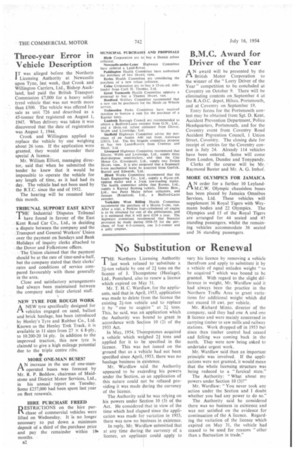No Substitution or Renewal
Page 36

If you've noticed an error in this article please click here to report it so we can fix it.
THE Northern Li last week refuse 2i-ton vehicle by on licence of J. Tho Ltd., Ponteland, also which expired on May 31. ensing Authority d to -substitute a of 22 tons on the pstone (Haulage), to renew a licence
Mr. T. H. C. Wardlaw, for the applicants, said that in April, 1953, application was made to delete from the licence the existing 21-ton vehicle and to replace it by "one to acquire" at 21 tons. This. he said, was an application which the Authority was bound to grant in accordance with Section 10 (2) of the 1933 Act, a ghed 21 tons and In May, 1954, Thrpstones acquired vehicle which we applied for it to be specified in the licence. This was not issued on the ground that as a vehicle had not been specified since April, 1953, there was no haulage business in existence.
Mr. Wardlaw said the Authority appeared to be exceeding his powers under the Section, as an application of this nature could not be refused providing it was made 4uring the currency of the licence.
The Authority sai1 he was relying on his powers under Sction 10 (3) of the Act. He considered that in view of the time which had ela sed since the application was made fo variation in 1953, there was now no business in existence.
In reply, Mr. Wardlaw submitted that at any time during the currency of a licence, an applicant could apply to
vary his licence by removing a vehicle therefrom and apply to substitute it by a vehicle of equal unladen weight "to be acquired" which was bound to be granted. With regard to the slight difference in weight, Mr. Wardlaw said it had always been the practice in the Northern Traffic Area to grant variations for additional weight which did not exceed 10 cwt. per vehicle.
Mr. Richard Minto, director of the company, said they had one A and one B licence and were mainly concerned in carrying timber to saw mills and railway stations. Work dropped off in 1953 but since then timber control had ceased and felling was coming back in the north. They were now being asked to undertake urgent work.
Mr. Wardlaw said than an important principle was involved. If the applications were not granted, it would mean that the whole licensing structure was being reduced to a "farcical state."
The Authority: "What about my powers under Section 10 (3)?"
Mr. Wardlaw: "You never took any action under the Section and I doubt whether you had any power to do so."
The Authority said he considered there was no business in existence, and was not satisfied on the evidence for continuation of the A licence. Regarding the variation of the licence which expired on May 31, the vehicle had ceased to be used for reasons "other than a fluctuation in trade."




























































































